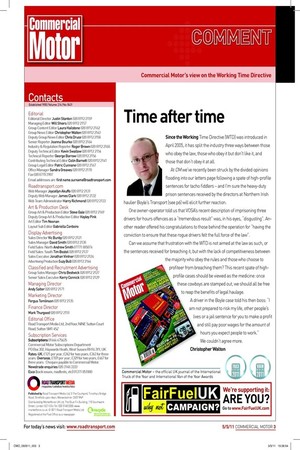Time after time
Page 2

If you've noticed an error in this article please click here to report it so we can fix it.
Since the Working Time Directive (WTD) was introduced in April 2005, it has split the industry three ways between those who obey the law, those who obey it but don’t like it, and those that don’t obey it at all.
At CM we’ve recently been struck by the divided opinions flooding into our letters page following a spate of high-profile sentences for tacho fiddlers – and I’m sure the heavy-duty prison sentences received by the directors at Northern Irish
haulier Boyle’s Transport (see p6) will elicit further reaction.
One owner-operator told us that VOSA’s recent description of imprisoning three drivers for hours offences as a “tremendous result” was, in his eyes, “disgusting”. Another reader offered his congratulations to those behind the operation for “having the conviction to ensure that these rogue drivers felt the full force of the law”.
Can we assume that frustration with the WTD is not aimed at the law as such, or the sentences received for breaching it, but with the lack of competitiveness between the majority who obey the rules and those who choose to profiteer from breaching them? This recent spate of highprofile cases should be viewed as the medicine: once these cowboys are stamped out, we should all be free to reap the benefits of legal haulage.
A driver in the Boyle case told his then boss: “I am not prepared to risk my life, other people’s lives or a jail sentence for you to make a profit and still pay poor wages for the amount of hours you expect people to work.” We couldn’t agree more.
Christopher Walton
















































